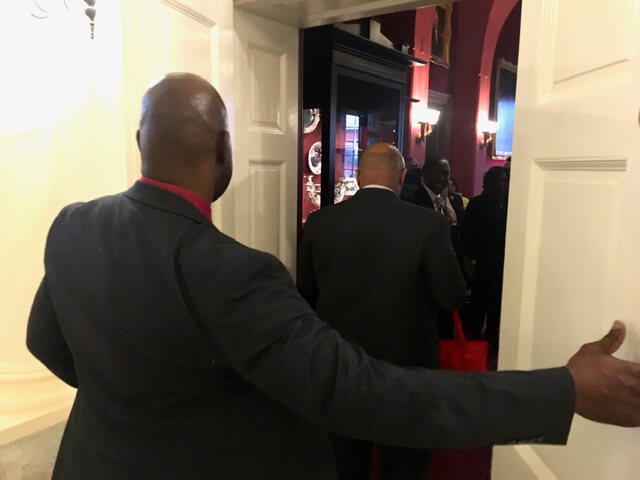Prince George’s Delegates Defend Closed-Door Meeting on School Construction

House leaders delayed a much-hyped vote on a school construction bill that is a top priority for Democrats Thursday, after Republicans and Democrats questioned whether jurisdictions they represent would get a big-enough slice of the $2.2 billion pie.
Questions about the distribution of funds in the Built to Learn Act prompted a closed-door meeting of Prince George’s County delegates, who met as a Democratic caucus ― as opposed to an all-Democratic county delegation, whose meetings are traditionally open to the public.
The legislation would allow the Maryland Stadium Authority to issue up to $2.2 billion in bonds — in addition to annual capital funding from the state — to pay for school construction projects. It could come up for a final vote in the House on Friday.
House Democrats had been previewing, through social media, a vote on the bill, and its likely passage, for several days.
But when the bill reached the floor, divisions among counties and Baltimore City became clear.
Del. Matthew A. Morgan (R-St. Mary’s) questioned the breakdown of proposed allocations for additional funding included in the bill.
“So we have $1.744 billion going to the six counties … and the other 17 counties are getting $230 million. I was just wondering why the discrepancy is so large,” asked Morgan, who noted that he intended to support the bill.
The legislation specifies that Baltimore City, Baltimore County and Montgomery County would each receive about $420 million, or 21% of the bond proceeds. Anne Arundel County would receive 12.5%, Howard would get 6.6% and Frederick would receive about 5.1%.
A separate fund is created for Prince George’s County to run its public-private partnership program, which House Appropriations Chairwoman Maggie McIntosh (D-Baltimore City) said would yield about $420 million in state money for school construction projects.
Maryland’s 17 other counties would share the remaining 11.5% of bond proceeds.
McIntosh said the allocations are based on past school construction spending. Rural counties could see greater investment through the state’s annual school construction program and other changes that allow them to recover added costs, she said.
Del. Jay Walker (D-Prince George’s) questioned his county’s allocation. Walker noted that, despite having a larger number of low-income students, Prince George’s County would receive the same amount of funding as neighboring Montgomery County, a larger, but wealthier, jurisdiction.
“It’s my job to make sure that Prince George’s County receives everything they deserve. And if you have a school system that’s the size of Prince George’s County with the issues of Prince George’s County … it seems as if the Appropriations Committee should have said, you know what, Prince George’s County does deserve more, they should get more,” Walker said.
Walker requested a delay on the vote to talk over the issue with his county colleagues and McIntosh agreed.
“I hope they support their county executive,” McIntosh said at the end of the floor session as the Prince George’s delegates filed toward the State House Caucus Room for their private meeting.
And they did.
“We’re all united,” said Del. Julian Ivey (D-Prince George’s) after the meeting, which lasted less than 20 minutes. “All 23 of us. We’re all voting for it. We’re strong supporters.”
But the members of the Prince George’s delegation decided to hold their meeting in private. A reporter who attempted to cover the meeting was instructed to leave by a State House security official.
The county lawmakers justified their closed-door gathering by calling it a meeting of the Prince George’s House Democratic Caucus, not the county delegation.
Because all the county’s delegates are Democrats, calling it a caucus meeting allowed the entire Prince George’s delegation to meet behind closed doors for a candid conversation on a politically sensitive matter without the public or the press listening.
Del. Wanika Fisher (D-Prince George’s), who ran the delegation meeting in her role as head of the county delegation’s Democratic caucus, defended the decision to shut the public out of the conversation.
“I just felt like we needed to talk,” she said. “As a caucus we meet on a whole host of issues that deal with our party, so it’s up to my prerogative to call a caucus when I think it’s appropriate,” she said.
“We’re all on one accord. We support the bill,” Fisher said.
In 2016, a citizen filed a complaint with the state’s Open Meetings Compliance Board, following a March 25 meeting of the Prince George’s House Democratic Caucus.
After investigating, the board determined that, under House rules, lawmakers were within their right to meet privately as the caucus, rather than in open session as the delegation.
‘A renaissance’ in Prince George’s
Although the vote on the House floor was delayed, there is broad bipartisan support for the Built to Learn Act.
At a hearing in January, the mayor of Baltimore and seven county executives ― including Angela D. Alsobrooks (D) of Prince George’s ― testified jointly in favor of the measure.
The public-private partnership outlined in the bill for Prince George’s would allow the county to build 18 schools over the next seven years “to create a renaissance in our county and to help Prince George’s County join in prosperity of this state,” Alsobrooks said at that hearing.
Republican Gov. Lawrence J. Hogan Jr., who introduced similar legislation, has written a letter of support.





 Creative Commons Attribution
Creative Commons Attribution